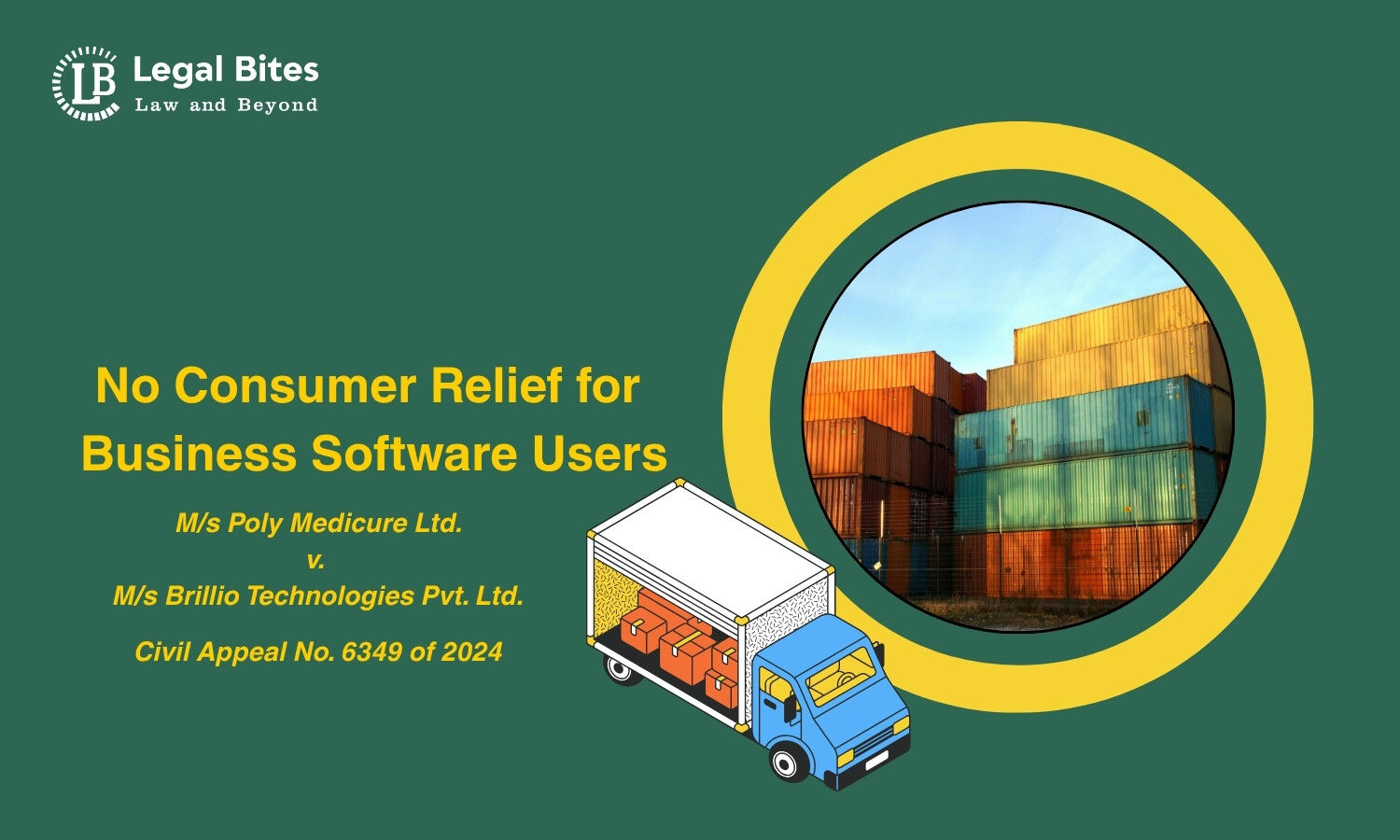
In a significant ruling that reshapes the contours of consumer law compliance for technology transactions, the Supreme Court of India in M/s Poly Medicure Ltd. v. M/s Brillio Technologies Pvt. Ltd. (2025 INSC 1314) held that a company purchasing specialised commercial software for its business operations is not a “consumer” under Section 2(1)(d) of the Consumer Protection Act, 1986. The Court affirmed that business-to-business (B2B) transactions aimed at enhancing operational efficiency, reducing costs, or augmenting profits fall squarely within the ambit of commercial purpose, thereby disentitling such buyers from approaching consumer forums.
The judgment resolves a long-standing ambiguity surrounding the consumer status of corporate entities purchasing software licences, a rapidly growing area of dispute in the digital economy. It clarifies that entities buying customised or enterprise software to automate business processes cannot invoke consumer remedies—even if the software later turns out to be defective or underperforming.
Background of the Case
The Dispute
Poly Medicure Ltd., a company engaged in the import and export of medical devices, purchased a software licence called “Brillio Opti Suite” from Brillio Technologies Pvt. Ltd. The software was meant to automate multiple export-import documentation and logistics processes. According to the appellant, the software malfunctioned and failed to meet performance commitments, prompting them to seek:
- refund of licence and development fees, and
- compensation for the deficiency of service.
A complaint was filed before the Delhi State Consumer Disputes Redressal Commission, which dismissed the complaint for lack of maintainability, holding that:
A company purchasing software for commercial use does not qualify as a “consumer”.
The National Consumer Disputes Redressal Commission (NCDRC) affirmed this view.
Issue Before the Supreme Court
The Supreme Court considered a single core question:
- Does a company buying specialised software for business operations qualify as a “consumer” under Section 2(1)(d) of the Consumer Protection Act, 1986?
Statutory Framework: Who is a “Consumer”?
Section 2(1)(d) of the Consumer Protection Act excludes from the definition of consumer any person who:
- buys goods for resale, or
- buys goods/services for any commercial purpose.
The Explanation carves out an exception:
- Use of goods/services for earning livelihood by means of self-employment is not considered a commercial purpose.
Thus, the law recognises individual end-users seeking livelihood protection—but not companies or business entities engaged in profit-oriented commercial operations.
The Court emphasised this difference.
Arguments Presented
Appellant (Poly Medicure Ltd.)
- The software was purchased for self-use, not for resale.
- It was meant to facilitate internal documentation, and not to directly generate profit.
- Being an “end user” should qualify the company as a consumer.
- Reliance was placed on: Lilavati Kirtilal Mehta Medical Trust v. Unique Shanti Developers, Sunil Kohli v. Purearth Infrastructure Ltd.
- The appellant argued that unless the purchased good/service directly leads to profit generation, it cannot be categorised as a “commercial purpose”.
Respondent (Brillio Technologies Pvt. Ltd.)
The software was admittedly purchased for the company’s business operations.
The suite performed functions such as:
- export documentation,
- duty drawback management,
- container tracking,
- FOREX management,
- Letter of Credit oversight.
These activities have a direct nexus with profit generation.
The respondent emphasised that allowing such disputes to be treated as consumer complaints would convert consumer fora into B2B arbitration substitutes, contrary to legislative intent.
Supreme Court’s Analysis
The Court undertook a detailed examination of the law on “commercial purpose”, relying on authoritative precedents.
1. Software Purchased for Business Automation = Commercial Purpose
The Bench held that automation of business processes is inherently linked to:
- improving efficiency,
- reducing operational costs,
- increasing profitability.
Thus, software purchased for such automation has a direct nexus to profit generation.
“Automation of business processes is undertaken not merely for better management but to reduce costs and maximise profits.”
The Court concluded that the transaction was unquestionably commercial.
2. Companies Cannot Claim ‘Self-Employment’ Exception
The Court drew a sharp distinction between:
- self-employed individuals who buy equipment to earn livelihood, and
- incorporated entities that buy tools to expand or streamline operations.
Poly Medicure, being an incorporated company, was engaged in an established commercial activity.
A company cannot invoke the ‘earning livelihood by means of self-employment’ exception.
Thus, the Explanation to Section 2(1)(d) did not apply.
3. End-User Status Does Not Automatically Make One a Consumer
Even though the buyer used the software internally, the Court held:
Self-use is irrelevant if the dominant purpose is business efficiency or profit augmentation.
This rejects the popular misconception that merely being the “end-user” negates commercial purpose.
Final Holding of the Supreme Court
The Supreme Court dismissed the appeal, holding:
- The software licence was purchased for commercial purposes.
- Poly Medicure Ltd. is not a consumer under Section 2(1)(d) of the Consumer Protection Act.
- Business-to-business software disputes cannot be adjudicated in consumer fora.
- Remedies, if any, must be sought through civil courts, arbitration, or contractual dispute resolution mechanisms.
Conclusion
The Supreme Court’s ruling in Poly Medicure Ltd. v. Brillio Technologies Pvt. Ltd. settles a crucial question in the digital era: commercial software buyers are not “consumers”. The judgment firmly draws the line between consumer protection and commercial contracting, ensuring that consumer forums remain dedicated to individual grievances rather than business disputes.
For India’s rapidly digitising economy, this decision brings much-needed clarity. Enterprise software contracts must now be treated as purely commercial agreements, governed by sophisticated contractual and arbitration mechanisms—not by simplified consumer remedies.
Businesses must therefore exercise heightened contractual vigilance, while software vendors gain relief from consumer litigation risks. The decision balances efficiency, legislative intent, and commercial fairness, reinforcing the principle that consumer law cannot be used to litigate profit-driven business transactions.
Important Link
Law Library: Notes and Study Material for LLB, LLM, Judiciary, and Entrance Exams